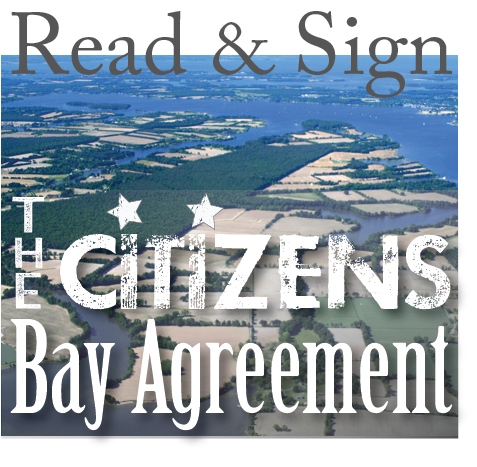Chesapeake Bay Action Plan
After decades of effort, the voluntary, collaborative approach to restoring the health and vitality of the Chesapeake Bay— the largest estuary in the United States—has not worked and, in fact, is failing.
A diverse group of 57 senior scientists and policymakers have joined forces to save the Bay. This is our plan.
Fracking in Maryland: Proceed with Caution
(Posted by Sen. Brian Frosh.)
You may have heard reports that oil and gas companies have leased about 90,000 acres of land in Maryland for drilling in the Marcellus Shale, a rock formation that undergirds the Appalachians from Virginia to Southern New York and is thought to contain trillions of cubic feet of natural gas.
Natural gas offers tremendous opportunity. It is the cleanest burning fossil fuel and can heat homes, run utilities, power vehicles, and help free the nation from foreign oil. It also promises significant economic benefits for western Maryland, as it rests under parts of Garrett, Allegany and Washington counties.
What Does Agribusiness Have to Hide?
(Posted by Scott Edwards.)
When it comes to big agribusiness and access to public information, the Chesapeake region is sadly part of a disturbing pattern that exists all across the country. And signs are it might be getting even worse.
Polluting industries are generally subject to a good amount of public transparency and disclosure about their practices, what types of materials they handle, how they dispose of their wastes, etc. Unfortunately, agribusiness has always enjoyed a level of state-sponsored secrecy that serves to undermine this general right of public access. The poor excuses for concealment offered by state departments of agriculture and environment and industry range from national security to trade secrets or, more often than not, no excuse at all.
Congressman Goodlatte and You
(Posted by Doug Siglin.)
Perhaps you read in the papers that the Goodlatte amendment to withhold funds from implementation of the Chesapeake Bay TMDL (Total Daily Maximum Load) is dead for the moment. But don’t bother to celebrate: It or something similar will be offered again not long after the spring rains.
Goodlatte Amendment Is A Travesty for the Bay
(Posted by Gerald Winegrad.)
In the anti-regulatory fervor prevailing in the House of Representatives, Virginia Congressman Bob Goodlatte (R-VA) succeeded in gaining the adoption of an amendment that would prevent the EPA from implementing the long-awaited, court-ordered Chesapeake Bay restoration plan known as the Chesapeake TMDL (total maximum daily load). The amendment was attached to the continuing resolution to keep the federal government operating. It was adopted on a vote of 239-185 on February 19, 2011, mostly along party lines and would block funding for overseeing the pollution diet that caps Bay-killing nutrients and sediment. Worse yet, all federal funding for the states to implement their pollution reduction plans through watershed implementation plans also would be blocked.
This rider was one of dozens of anti-environmental riders attached to the must-pass resolution to keep the government open. The pollution diet under the TMDL was necessitated by the Bay states repeated failures to meet agreed upon reductions for nutrient and sediment pollutants so as to clean-up the 90 percent of the Bay that is so polluted that it violates Clean Water Act standards. The Goodlatte amendment could actually block more than $300 million in federal funding to curb agricultural, sewerage, and urban runoff pollutants. The language provides:
Fertilizer and Waste Are Killing the Chesapeake Bay
(Posted by Tom Fisher.)
For the last 400 years agriculture has been an important component of the Chesapeake Bay watershed. Wheat and other grains in the 1700s and 1800s led to widespread clearing of forests, but poor management practices resulted in soil erosion that left a clear signal in the sediments that is still visible in cores retrieved from the bay. The introduction of European soil conservation methods in the 1800s helped stabilize a denuded landscape, and abundant oysters and submerged grasses cleared the waters.
Chesapeake Bay Literacy Meets Chesapeake Bay Action
(Posted by Bill Dennison.) The seven essential things that one needs to know to become literate about Chesapeake Bay have been described in a previous post on the Integration and Application Network blog as the following: Chesapeake Bay is a large, shallow and productive estuary formed by a drowned river valley. The extensive Chesapeake watershed…
The Bay Is Not Improving
(Posted by Tom Horton.)
In recent weeks there’s been a two-pronged push by agricultural interests to credit farmers with already doing most of what’s needed to reduce pollution; also to discredit federal computer modeling that says farmers need to do a lot more to meet the Chesapeake Bay restoration goals.
The extra credit comes courtesy of the U.S. Department of Agriculture’s Natural Resources Conservation Service; the challenge to EPA’s modeling effort comes in a lawsuit filed by the American Farm Bureau.
For Bay Clean Up, Goals Without Consequences Are Seldom Met
(posted by Tim Simpson)
Goals without consequences are almost never met by nations, states or individuals. Weight loss comes to mind. While being overweight has health consequences (not unlike ignoring the health of the Bay), their onset is gradual and long-term so it’s easy to ignore our well intentioned goals. But, what does it matter if we wait one more year? That same logic has been applied to the Bay Program and we are almost to the point of not having leaders who remember what a healthy Bay is.
We are senior Chesapeake Bay scientists and policymakers from Maryland, Virginia and Pennsylvania who have concluded that after decades of effort, the voluntary, collaborative approach to restoring the health and vitality of the largest estuary in the United States has not worked and, in fact, is failing. Our group unanimously recommends that all states draining into the Chesapeake Bay adopt our 25 action items in their Watershed Implementation Plans (WIP) and implement them to improve the Bay’s water quality and to meet the requirements of the Clean Water Act.
Sign up for news & updates from Patuxent Riverkeeper
